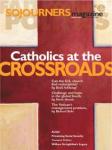This year sees a quarter century of U2 records and the band’s induction into the Rock and Roll Hall of Fame. However well deserved, it seems a premature designation. Such accolades are usually heaped on the formerly great, the long disbanded, or the now irrelevant. U2 shatters these notions from the first notes of the band’s latest album, How to Dismantle an Atomic Bomb.
This Atomic Bomb begins with an explosive reverberation of driving bass, slamming drums, and guitar poised for attack. "Vertigo" is the album’s opener; it’s an aggressive beginning that compresses an LP’s worth of intensity into three minutes. It might be the most compact piece of musical dynamite that U2 has yet produced.
Longtime listeners will recognize moments in "Vertigo" - The Edge’s uniquely keening guitar, Bono’s vocal inflection - that recall their debut, Boy. There are threads of continuity here; producer Steve Lillywhite, who worked with U2 on its first three albums, is back for this one. But this isn’t an exercise in nostalgia. Twenty-five years ago U2 was a baby band searching for its sound, a lead singer discovering his voice. Atomic Bomb resonates with the confidence of four men who’ve played music together for more than half their lives, but who have found a way to recapture a youthful energy.
The album is dedicated to Bono’s father, Bob Hewson, who died in 2001. Several songs ruminate on their loving but contentious relationship. "Sometimes You Can’t Make It On Your Own" is a son’s plea to be let in on his father’s struggles and a recognition of the gifts passed between them. ("And it’s you when I look in the mirror/And it’s you when I don’t pick up the phone..."). The ballad has Bono singing in upper ranges he hasn’t reached since The Joshua Tree. At a free concert in Brooklyn the week the album was released, he credited that ability as one more gift from his father: "as those we love so often do when they leave us.... He gave me back a voice I haven’t had in years."
SONG AFTER SONG stands out. "Love and Peace Or Else" is an appeal to disarm both hearts and armies. Musically it calls to mind Stevie Wonder’s "Higher Ground." In "Crumbs from Your Table," Bono reflects on his work in Africa with the devastating lyric, "Where you live should not decide/Whether you live or whether you die/Three to a bed" - something he witnessed with AIDS patients in Malawi.
Married for more than 20 years to his high-school sweetheart, Bono pays tribute to fidelity in "A Man and A Woman" with the lines, "I could never take a chance/Of losing love to find romance." Adam Clayton’s swirling bass makes commitment sound sexy.
"City of Blinding Lights" is the requisite anthem, something fans expect from each U2 album. It features some of the album’s punchiest lyrics, from the "My Back Pages"-esque "I knew much more then than I do now" to a bold response to that claim: "Time won’t leave me as I am/But time won’t take the boy out of this man." "Lights" ends on a note of humor, which the band as been accused of lacking ("Blessings are not just for the ones who kneel...luckily").
U2 often closes its albums with a song that is simultaneously a prayer. With "Yahweh," the musicians of U2 are as explicit as they’ve ever been in declaring their faith: "Take this soul/Stranded in some skin and bones/Take this soul/And make it sing." "Yahweh" soars in this vein until the final plea, "Take this city/If it be your will/What no man can own, no man can take/Take this heart/...And make it break."
If bands on the radio today are looking to break hearts, the hearts are not their own, and they’re not asking Yahweh to do it. I’m glad the Rock and Roll Hall of Fame is honoring U2’s work. More than that, I’m grateful U2 is still making music that moves us.
Kimberly Burge is senior writer and editor at Bread for the World in Washington, D.C.

Got something to say about what you're reading? We value your feedback!